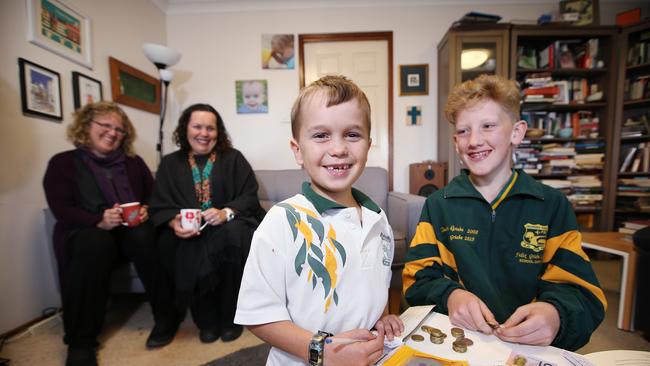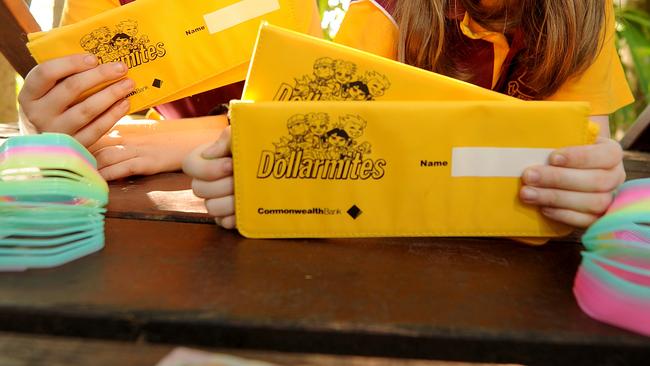A scathing ASIC report has prompted State Governments to scrap Dollarmites scheme
For 90 years the Dollarmites program was a school staple, but at some point it attracted big name opponents who have championed its downfall.

Business
Don't miss out on the headlines from Business. Followed categories will be added to My News.
For nearly a century, Commonwealth Bank’s Dollarmites program was aimed at teaching school kids a life-long lesson to save.
A staple in most primary schools across the country, the junior banking program, in place since 1931, encouraged students to get into the habit of setting money aside at a young age. But at some point it lost its way.
The $10bn moneymaker for the nation’s largest lender is now being blacklisted as states and territories wake up to the unethical marketing exercise that duped generations of young kids.
Queensland this week became the latest state to shun the controversial school banking program following a two-year review by the corporate regulator that found it was little more than a brand loyalty exercise, with no evidence of the program actually improving savings behaviour.
The state’s Education Minister Grace Grace said the Dollarmites program wouldn’t be renewed when the contract expires in July, as it failed to provide financial literacy to students.
Queensland follows Victoria and the ACT in banning the program from state schools in the wake of ASIC’s damning review released in December, with curriculum-linked financial literacy lessons slated to be introduced in its place.
The bans were sparked by ASIC’s findings following its lengthy review to determine the benefits and risks of school banking programs.
As part of the review, the regulator conducted consumer research, carried out public consultation and engaged with the banks themselves. It also commissioned a literature review on the impact of marketing to children.
“School banking programs claim to help children develop long term savings habits; however, providers were unable to demonstrate that these programs in and of themselves improve savings behaviour,” ASIC found.

Little-known payments to schools for implementing the programs, meanwhile, served to incentivise them to encourage greater participation in the programs, the regulator found.
The extent of the annual incentives handed over to Queensland schools were uncovered by the ABC in 2018: CBA paid Queensland primary schools close to $400,000 in 2017 in a bid to pump up participation.
Across the country, the lender paid out millions of dollars to schools each year to take part in the controversial program.
Schools are understood to have pocketed $100 per 100 students who participated each year, as well as a $200 annual fee for taking part in the program. They also earned money when kids made a certain number of deposits in their accounts.
“Young children are vulnerable consumers and are exposed to sophisticated advertising and marketing tactics by school banking program providers,” ASIC’s review found.
“School banking program providers fail to effectively disclose that a strategic objective of these programs is customer acquisition.”
Even before ASIC’s scathing review, the program had received stinging criticism over the years, including from Barefoot Investor Scott Pape and numerous consumer groups.
Mr Pape’s campaign against CBA and Dollarmites spanned more than a decade, as the financial expert railed against banks teaching financial literacy in schools.
“Having the Commonwealth Bank, Australia’s largest issuer of credit cards, teaching our kids about money is like having Ronald McDonald teach kids about nutrition. It’s not healthy,” Mr Pape said at the time of the review in 2019.

Established in 1931 when Commonwealth Bank was still government-owned and operated, Dollarmites in time became a major moneymaker for the lender, with a 2018 analysis estimating it was worth $10bn to the bank, based on retention rates.
Consumer advocacy group CHOICE, another vocal Dollarmites critic, in its own research found that 46 per cent of Australians had opened their first bank account with CBA, while 34 per cent of savers still have their first bank account.
“It’s time to get Dollarmites out of all schools across Australia. Dollarmites is a corporate marketing exercise disguised as financial education,” CHOICE banking expert Patrick Veyret said following the Queensland government’s decision
“It’s only a matter of time before the other states and territories act on this marketing program targeted at Australian kids.
Commonwealth Bank had enjoyed a “free ride” in the nation’s schools for over 90 years, signing up customers for life, he said.
“Commonwealth Bank should cut their losses, dump the Dollarmites and donate to independent financial education programs instead.”





